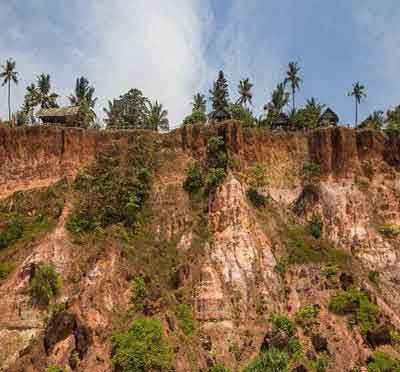Date: 16/02/2023
Relevance: GS-1: Indian culture will cover the salient aspects of Art Forms, literature, and Architecture from ancient to modern times; Indian Geography.
Key Phrases: draft Geo-heritage Sites and Geo-relics (Preservation and Maintenance) Bill, 2022, Director General of the Geological Survey of India, palaeontological research, National Geo-heritage Authority,
Why in News?
- India is home to a rich natural heritage that includes a diverse range of geological formations, sediment, and fossils.
- However, the country has made limited efforts to preserve and communicate the importance of this natural 'geo-history'. The neglect of this natural heritage has led to its destruction and appropriation.
- The draft Geo-heritage Sites and Geo-relics (Preservation and Maintenance) Bill, 2022, piloted by the Ministry of Mines, is an attempt to give the process of conservation firmer footing.
Provisions of the Bill:
- The central government may declare a site as a geo-heritage site of national importance. Geo-heritage sites must contain features of geological significance, such as geo-relics or natural rock sculptures. Geo-relics are movable relics such as fossils or meteorites.
- The Bill aims to give the Director General of the Geological Survey of India (GSI) the power to declare sites as having 'geo-heritage' value and take possession of relics (fossils, rocks) that rest in private hands.
- The Bill prohibits construction, reconstruction, repair, or renovation of any building within the geo-heritage site area or utilization of such area in any other manner, except for construction for preservation and maintenance of the geo-heritage site or any public work essential to the public.
- Penalties for destruction, removal, defacement, or contravention of any direction issued by the Director General, GSI in the geo-heritage site are mentioned. There is a penalty of imprisonment which may extend to six months or a fine which may extend to Rs.5 lakh or both. In the case of a continuing contravention, an additional fine of up to Rs.50,000 for every day of continuing contravention may be imposed.
Geological Survey of India (GSI)
- The Geological Survey of India (GSI) is a scientific agency of India.
- It was founded in 1851, and is a Government of India Ministry of Mines organization, one of the oldest of such organizations in the world and the second oldest survey in India after Survey of India (founded in 1767), for conducting geological surveys and studies of India, and also as the prime provider of basic earth science information to the government, industry and general public, as well as the official participant in steel, coal, metals, cement, power industries, and international geoscientific forums.
- The main functions of the GSI relate to the creation and updation of national geoscientific information and mineral resource assessment.
- It is headquartered in Kolkata and has six regional offices located at Lucknow, Jaipur, Nagpur, Hyderabad, Shillong, and Kolkata. Every state has a state unit.
What are the Geo-heritage Sites and Geo-relics?
- According to a 2016 press release by the Ministry of Mines, the Geological Survey of India (GSI) declares geo-heritage sites/ national geological monuments for protection and maintenance.
- The GSI or the respective state governments take necessary measures to protect these sites.
- Geo-heritage Sites:
- The draft bill defines Geo-heritage sites as “sites containing geo-relics and phenomena, stratigraphic type sections, geological structures and geomorphic landforms including caves, natural rock-sculptures of national and international interest; and includes such portion of land adjoining the site,” that may be required for their conservation or to access to such sites.
- Geo-relics:
- Geo-relic is defined as “any relic or material of a geological significance or interest like sediments, rocks, minerals, meteorite or fossils”. The GSI will have the power to acquire geo-relics “for its preservation and maintenance”.
- The 32 geo-heritage sites spread across 13 states include the Volcanogenic bedded Barytes of Mangampeta in the Cuddapah district of Andhra Pradesh, the Akal Fossil Wood Park in Jaisalmer, Rajasthan, and others.
Controversy Surrounding the Bill
- Experts who work outside the GSI-fold in Central and State universities, institutes of national importance, and private organizations fear that such absolute vesting of powers in the GSI alone may impede palaeontological research.
- They demand a more inclusive body, on the lines of a National Geo-heritage Authority, that can democratically decide on declaring sites as being of 'geohistorical' importance and how best to preserve artifacts and finds.
The Need for Balance:
- While there are merits and demerits to either approach to governance, it is crucial to keep in mind that while acting as a ring fence, legislation should not become a tool for suppressing independent investigation.
- Given the premium for land and India's economic needs, there will be conflict over questions of preservation and livelihood, but any legislation must endeavour to balance these forces and enable consensus.
Conclusion
- The draft Geo-heritage Sites and Geo-relics (Preservation and Maintenance) Bill, 2022, is a crucial step towards the preservation of India's geo-history.
- While the bill's provisions have raised concerns among experts, the need for preserving India's natural wealth cannot be understated.
- It is essential to strike a balance between preservation and livelihood and to create a more inclusive body that can democratically decide on the preservation of artifacts and finds.
- The preservation of India's geo-history has immense scientific, cultural, and economic value, and it is essential to create a comprehensive framework for its preservation.
Source: The Hindu
Mains Question:
Q. Explain the concept of Geo-heritage Sites and Geo-relics and assess the potential of the draft Geo-heritage Sites and Geo-relics (Preservation and Maintenance) Bill, 2022 in preserving the natural wealth found in such sites.









